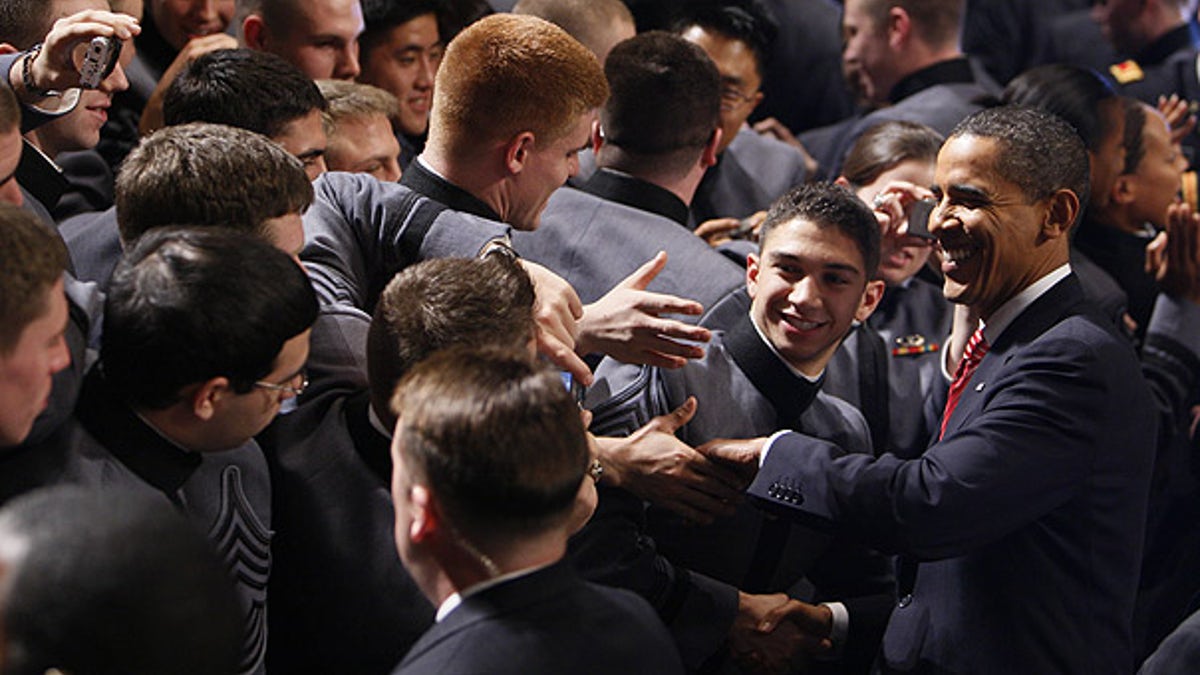
Dec. 1: President Barack Obama greets cadets after speaking about the war in Afghanistan at the U.S. Military Academy at West Point, N.Y. (AP)
President Obama, after vowing last week to "finish the job" in Afghanistan, presented the nation Tuesday with a new war strategy that seemed to contain something for everyone: a troop increase, a preliminary timetable for withdrawal, tough words for the Afghan government and an emphasis on the U.S. partnership with Pakistan.
But by offering something to all sides in the debate, Obama may have left all sides unsatisfied -- from the liberal groups who have protested any troop increase to the conservatives who object to a fixed timetable for withdrawal that, they say, could signal to enemies simply to lie low and wait.
The reaction to the plan in the hours after Obama's prime-time speech was swift and wide-ranging, setting the tone for a potentially contentious foreign policy debate that could define the rest of Obama's presidency.
Obama, speaking at the U.S. Military Academy at West Point, N.Y., said he aims to begin winding down the war by July 2011 but first will quickly send 30,000 to bolster military efforts there. The added troops "will increase our ability to train competent Afghan security forces, and to partner with them so that more Afghans can get into the fight," he said. "And they will help create the conditions for the United States to transfer responsibility to the Afghans."
Sen. Kit Bond, the top Republican on the Senate Intelligence Committee, said the strategy will "allow our troops to return on success and put Afghanistan on the road to stability."
But the Missouri Republican added, "We need a success strategy, not an exit strategy. When it comes to troops movements in Afghanistan, the president should listen to the military commanders on the ground, not arm-chair generals in Washington."
Rep. Dan Burton was even more dismissive of Obama's timetable.
"The one thing that you never do is telegraph your punch," said Burton, the top Republican on the House Foreign Affairs' Subcommittee on the Middle East and South Asia. "He is telling our enemies exactly what we're going to do and it's just wrong. Every military officer I've ever met will tell you the same thing."
Much of the Republican reaction fell along those lines: praise for providing Gen. Stanley McChrystal with most of the 40,000 troops he requested but criticism for announcing an exit strategy.
"Although this decision took far too long and it should not have, I am glad the president will finally provide General McChrystal with the troops he needs," Republican National Committee Chairman Michael Steele said in a written statement. "However ...sending mixed signals by outlining the exit before these troops even get on the ground undermines their ability to succeed."
Democrats raised concerns about cost of sending more troops and the risk of a long-term escalation of the fighting.
Rep. Barbara Lee of California went as far as to say she is prepared to offer a bill that would prohibit funding for an escalation of troops.
"We can't continue to send more troops and expect different results," Lee said. "Our military is already stretched too thin. Afghanistan needs a political solution -- not a military one. Adding more troops won't change this important fact."
Sen. Bernie Sanders, I-Vt., expressed concerns over sustaining a war effort without more international help, in the face of a brutal recession and with so much uncertainty over the future of the Afghan government.
"My nightmare is that we may get caught in a quagmire situation from which there will be no successful exit," he said in a written statement.
Martha Coakley, front-runner in the special election to succeed the late Sen. Edward Kennedy of Massachusetts, said in an interview with the Wall Street Journal that imposing a strict timetable wasn't enough to win her backing. "If you asked me to vote today, my vote would be no," said Coakley, whose Democratic primary election is next week.
The liberal activist group MoveOn.org -- one of Obama's staunchest supporters in the presidential campaign and in the early months of his administration -- issued a blistering e-mail to members charging that the Obama plan "deepens our involvement in a quagmire." Democratic candidates in Ohio and Pennsylvania facing primary challenges, including Sen. Arlen Specter, were also opposed.
Rep. David Obey, chairman of the House Appropriations Committee, reasserted his call for a surtax on the war.
"If this endeavor is to be pursued, we must have a renewed sense of shared sacrifice -- because right now only military families are paying the cost of this war," the Wisconsin Democrat said in a written statement. "A progressive war surtax is the fairest way to pay for it -- fairest to working class families and fairest to military families."
Other Democratic leaders, however, offered nothing but praise for Obama's strategy.
"President Obama inherited a deteriorating situation in Afghanistan because the Bush administration did not have a plan to get the job done," House Speaker Nancy Pelosi said in a written statement, adding that the president "articulated a way out of this war."
"The American people and the Congress will now have an opportunity to fully examine this strategy," she said.
McChrystal is expected to appear before Congress soon. In a statement from Kabul, he said: "The Afghanistan-Pakistan review led by the president has provided me with a clear military mission and the resources to accomplish our task. The clarity, commitment and resolve outlined in the president's address are critical steps toward bringing security to Afghanistan and eliminating terrorist safe havens that threaten regional and global security."












































